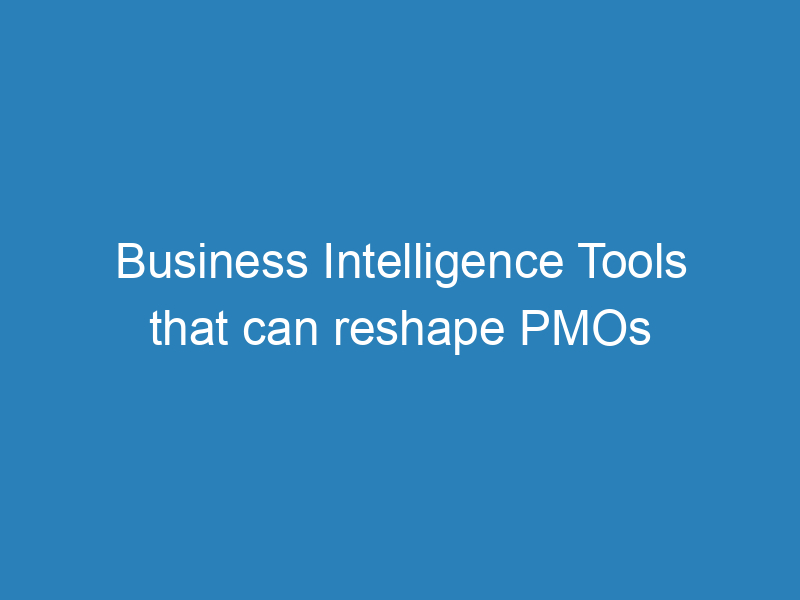Table of Contents
A business intelligence analyst interprets an organizational data to come up with the right decision to achieve a goal. He is paramount to businesses, nowadays. This article will give clarity to what does a business intelligence analyst really do and how can someone become one.
Firstly, What is Business Intelligence (BI)?
Business Intelligence is a comprehensive process of analyzing the data of any organization. It involves harnessing innovative technologies to generate better business decisions. This improved decision can have a monumental impact on the company.
The data is carefully analyzed to drive some actionable outcomes. It eventually can help the company
- To manage their data more efficiently
- Drive some revenues
- Make improvements in operational decision-making with strategic planning
The term “business” is not just related to profit-driven businesses. It can also be extended to other types of businesses. For example institutions, private organizations, governmental organizations, etc. The “Intelligence” depicts the tools, methods, and new technologies used for data mining.
What is Data Analytics?
Data is known to be the “new oil” in many industries. It enables companies to enhance their business strategies to have more profit. The data would be pointless. Until it is used effectively for the company to derive actionable insights from the data. Here comes Business Intelligence. It fulfills the need for companies to leverage their data intelligently. It helps to establish their organization goals through Business Intelligence.
Business Intelligence is a mixture of using business analytics with data mining and data visualizations. The goal is to generate excellent actionable results. The aim of using BI in any organization is to target those lacking points which decrease the revenues and improve them. It helps to multiply revenue manifolds, and more power is gained over the business rivals.
What Does a BI analyst Do?
An individual trained in computer languages along with Business Intelligence tools and technologies. BI analyst is a professional who with the help of advanced tools
- Define some KPIs (Key Performance Indicators) drive from the database
- Execute DW (Data Warehouse) approaches by mining the Big Data.
The only goal for a business intelligence analyst to enable the decision-makers with credible, actionable insights. This will enhance the business efficiency, increase the revenues, scale up the market position.
It is the Business Intelligence Analyst whose job is to bring changes into the organization. The Business Intelligence Analyst analyzes the data to make changes in the lacking departments. His decision is based on the analytical reports derived from the in-depth BI analytical reports. Later the changes are made in the decision-making department. The BI analyst handles the analysis process and creates the data modeling designs. It is achieved with the help of data that is available in the company database. The analyst has to understand the culture and goals of the organization. To better align it with the business intelligence to generate the needed results required for the company’s growth.
Collect business intelligence data
The raw data is pointless if it does not become information at any point. Many organizations have a lot of data stored in their database that needs to be processed properly. The first step of a business intelligence analyst is to collect the business intelligence data. The business intelligence analyst collects the data from the database of the organization. It is a collection of raw data from different categories of different sources available in different formats.
Experienced business intelligence analyst collects data by “Automating Processes”. This is a process that reduces the time that an individual spends on gathering the data. It eliminates the old techniques to gather data. Rather it uses the newly invented business solutions. Automation processes have tools that allow financial policymakers to rapidly attain the required data. The goal is to bring it in an accessible form that is not complicated but easy.
Business intelligence analysts use “key performance indicators” (KPI). KPI is used to keep track of all data, measure all the facts and figures. It helps to access the information you need for your business. It includes quantifiable measurements of your business. It is easily identifiable from this process that you are achieving your desired goals and objectives. It’s easy because it eliminates the process of you going through all the data
Store the data
The business intelligence analyst goes to the next process of storing the data. Storing the data is a comprehensive process known as “business intelligence architecture”. With the help of tools data visualization is created and new ways are explored to store the data. Data warehousing is known to be the main component. The data is stored in a particular manner which later on is analyzed.
A data warehouse is where the amble amount of data is organized for analysis. It is designed to locate reporting and analysis for big data. A data warehouse is where the process of storing all the company’s data in various sources. This is employed to focus on analysis and generating some content. Which will later on be beneficial for the company through BI tools.
Analyze the data
In BI architecture, this step focus on the analysis of the data. Business intelligence analysts use the data and analyze it with advanced tools. It is operated, processed, and cleaned in particular steps with the help of a data warehouse. BI application tools are invented over the years to enhance the analysis process for enhancing businesses.
The following three stages are involved.
- Descriptive analysis
- Statistical analysis
- Data mining
Descriptive analysis is done through reports where there are fixed structured formats with direct queries. It is the transformation of data by calculating, sorting, filtering, and grouping techniques.
Data mining is the process of making the raw turning into something beneficial information. Many business solution providers give software that helps in data mining. A large bulk of data is analyzed. Further, it drives information that help the business makers to make effective decisions. Business intelligence analysts analyze the data through data mining. It helps the policymakers to initiate strategies that generate more sales and strengthen the market position.
Prepare analytical reports
Last but not the least, the process ends with the business intelligence analysts preparing analytical reports. They present the data to the company in which the analysts summarize, organize the information. The analysts with the help of tools like tables, charts, and other visual techniques present the outcome of the analysis. The result is presented to the professionals of the company in comprehensible formats. In involves visual aids like bar charts, pie graphs.
How to become a Business Intelligence Analyst?


To become a business intelligence analyst the individual is required to
- Bring in-depth knowledge about Big Data handling
- Bring new insights about future intelligence
You should understand how to gather data and analyze the analytical reports. Also, have diverse knowledge about the existing databases and new complex databases. The BIA also has an ample amount of knowledge about media analytical tools. These are designed to analyze the database.
The BI analysts look into every single detail about the company. The aim is to find areas where the company can increase the profit margins with effective data analysis methodologies.
In the section below we explain the qualifications and skills needed to become a business intelligence analyst.
What qualifications does a BI analyst need?
The qualification of a business intelligence analyst is at least a bachelor’s degree in
- Computer science
- IT
- Software engineering
- Statistics
- Business
- Management
- Accounting-related fields
Some senior business empires require an MBA as well. Some organizations do offer jobs for undergraduate students with a background in IT and data science.
If you want to have a job as a BI analyst try doing an internship at any business firm. You may get an internship as a data report writer or data analyst. Which will be enough for you to gain experience. It takes a minimum of years to become a business analyst. You can complete your bachelor’s degree meanwhile. An internship to gain some experience.
Business intelligence analyst skills
Any business intelligence analyst should have the following skills
- Outstanding communication skills and a great sense of ability to work in a team
- Excellent leadership qualities to lead the team
- Knowledge about database design and data architecture.
- Knowledge about data mining and advanced analytical tools.
- Creative analytical ability thinking and quality to problem solve quickly
- A good business intelligence analyst has a good balance between IT and the Business.
- Should be able to handle AQL
- Knowledge about cloud computing
- Expert at tools like Qlik, SAS, Python, and Tableau
Business intelligence analyst job requirements
The job description of a BIA is to review the database and oversee the deployment of data to the data warehouse. To collect data and bring some data from the warehouse for analysis. Using software applications to analyze the current data with the previous one. Creating in-depth summaries about the company’s current position in the market. To initiate policies and actionable procedures for the analysts of data. The business intelligence analysts also discover new strategic plans and procurement of the data after the in-depth data mining.




